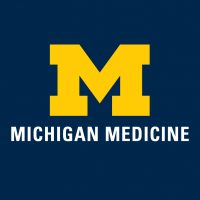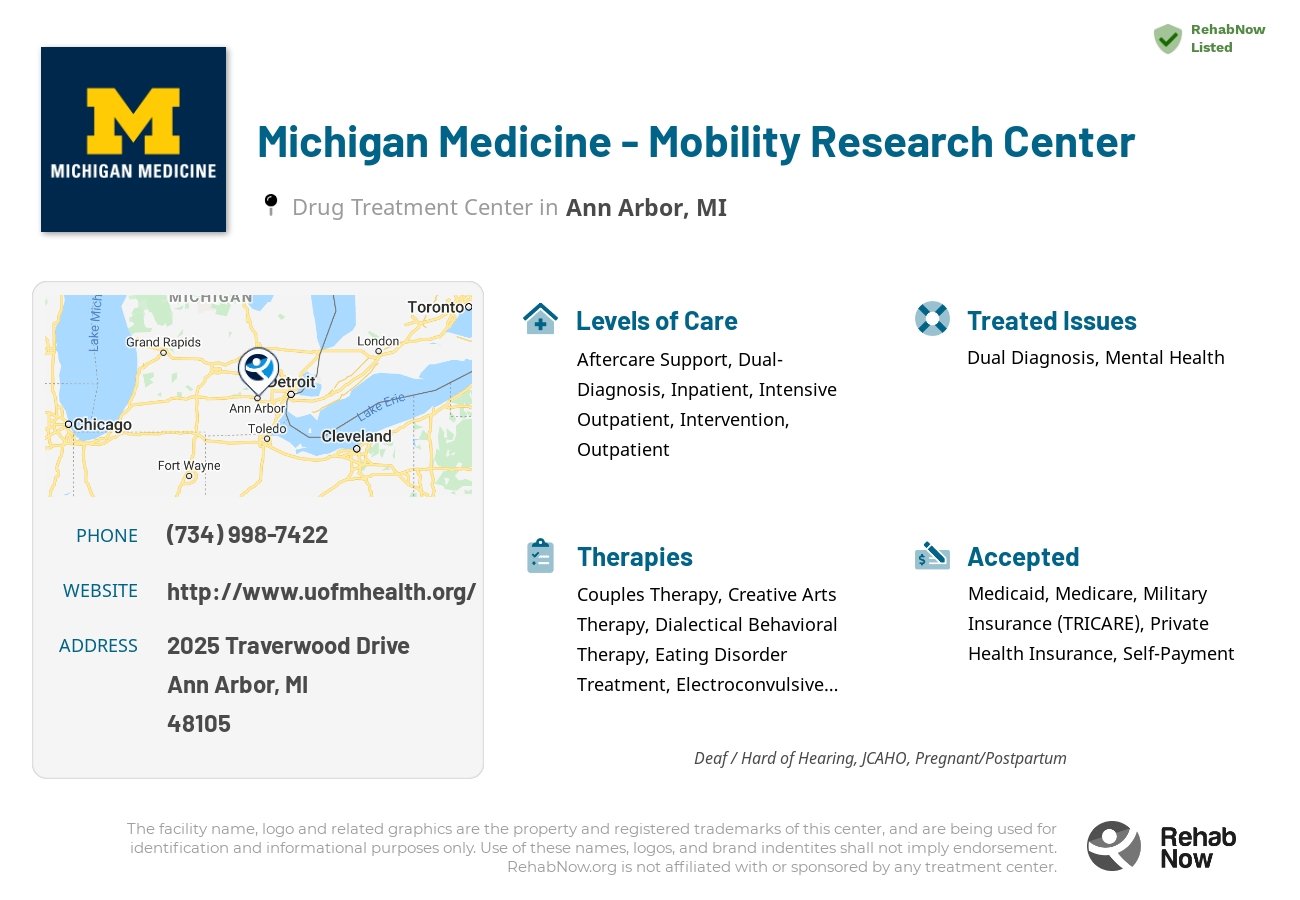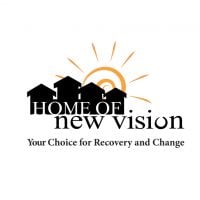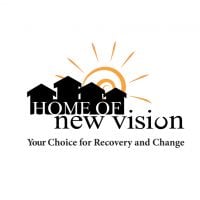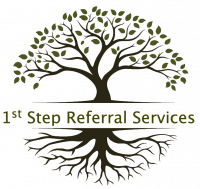Michigan Medicine - Mobility Research Center
Drug Rehab Center in Ann Arbor, Michigan
The Michigan Medicine - Mobility Research Center provides evidence-based, personalized, and comprehensive treatment options for individuals struggling with addiction, mental health, and substance abuse issues, with a knowledgeable and experienced staff that aims to create a safe and healing environment.
About Michigan Medicine - Mobility Research Center in Michigan
Michigan Medicine - Mobility Research Center is a reputable Addiction Treatment Facility located in Ann Arbor, MI. Established in 1850, this center specializes in providing comprehensive treatment for individuals struggling with addiction and co-occurring disorders such as Dual Diagnosis, Eating Disorders, and Mental Health conditions. The facility offers a range of treatment options, including Inpatient, Intensive Outpatient, Outpatient, and Aftercare Support. Michigan Medicine - Mobility Research Center is accredited by the Joint Commission on Accreditation of Healthcare Organizations (JCAHO), ensuring that they meet rigorous standards of quality and safety in their treatment programs. They also accept Private Health Insurance, making their services more accessible to those seeking help. As an affiliate of the University of Michigan, this facility has access to cutting-edge research, expertise, and resources, providing patients with the highest level of care.
At Michigan Medicine - Mobility Research Center, individuals struggling with addiction and substance abuse can find a variety of services designed to address their specific needs. The center offers comprehensive Dual Diagnosis treatment, helping individuals facing both addiction and mental health disorders receive integrated care. Additionally, their facility specializes in the treatment of Eating Disorders, providing specialized programs to address these complex conditions. With a range of treatment levels, including Inpatient and Intensive Outpatient options, individuals have access to personalized care that fits their unique circumstances. Michigan Medicine - Mobility Research Center also provides Intervention services, assisting families in guiding their loved ones toward treatment. With a focus on aftercare support, they aim to ensure a smooth transition to life after treatment, equipping individuals with the tools and resources necessary for long-term recovery.
Genders
Ages
Modality
Additional
Accreditations

JCAHO
Conditions and Issues Treated
Dual Diagnosis therapy is considered more successful than traditional rehab methods because it treats the addiction and the underlying mental health disorder simultaneously. This comprehensive approach gives Ann Arbor, MI patients the best chance for long-term recovery. If the patient does not receive treatment for both conditions, they are more likely to relapse.
Levels of Care Offered
This center offers a variety of custom treatment tailored to individual recovery. Currently available are Aftercare Support, Dual-Diagnosis, Inpatient, Intensive Outpatient, Intervention, Outpatient, with additional therapies available as listed below.
Inpatient facilities offer a complete rehab program where the patient stays for an extended period. This allows the staff to monitor the patient on a round-the-clock basis and provide medical assistance if needed.
A significant benefit of inpatient rehab is that it allows for a safe environment for treatment. The patient doesn’t have access to drugs or alcohol, and they’re surrounded by people that want them to succeed and change their lives. Treatment starts with detox and behavioral therapy, followed by group therapy and family involvement.
An intensive outpatient treatment program, or IOP, is set up for those struggling with an addiction to begin the recovery process. However, the patient will not live at the facility during treatment.
IOP involves patients coming in and out of a medical office building regularly to receive therapy and other services while continuing their life outside of these visits.
IOP is a step up from drug detoxification or alcohol detox. However, it’s still considered a phase of recovery rather than the ultimate goal. There are many rehabs and treatment facilities available to patients in need of IOP.
Outpatient treatment consists of counseling and therapy sessions. The outpatient treatment process begins with the addict’s initial detox period, lasting about ten days. Outpatient treatment is used for those who are at moderate risk for “slipping back” into the addiction. It is also used for those who are not currently experiencing any side effects from withdrawal, can handle social pressure, have a stable living environment, and have a good support system.
Not everyone dealing with addiction is prepared to engage in a recovery program. Michigan Medicine - Mobility Research Center‘s Intervention Programs can be beneficial for these individuals. The individual’s friends and family will call and set up an intervention in or near Ann Arbor, MI, and at which a specialist will come and lead the discussion.
Aftercare support is often overlooked in the treatment of drug and alcohol addiction. However, it’s an essential part and should be considered when planning a course of rehab.
Aftercare is a term that’s used to refer to any sort of continuing care offered for a drug addict who has voluntarily entered a rehabilitation program. This type of care can be provided in several settings, including outpatient therapy sessions after the addict has completed an inpatient program. There are also 12-step support groups, such as Alcoholics Anonymous, which can provide additional help for addicts trying to stay sober.
Aftercare is vital because addicts often face many challenges as they attempt to recover from drug addiction or alcoholism. Because of the powerful nature of these addictions, those who struggle with a drug or alcohol problem will likely have to face the craving for their substance of choice for the rest of their lives. Recovering can be a lonely and frustrating endeavor, especially without the support of others who are going through similar situations.
Therapies & Programs
Individual Therapy is a crucial component of addiction recovery. Therapists work with patients to identify the root of their addiction and figure out how to better handle the issues that led to them using drugs. Individual Therapy is one on one sessions where people meet with their therapist. Individual therapy provides a safe space for people to open up and discuss personal and sensitive topics which they may not feel comfortable discussing in a group setting.
In this type of therapy, therapists can develop specific solutions for each patient, which helps speed up their recovery process. In addiction recovery, therapy is a crucial part. It allows patients to go deep into their core issues and discover how those problems can be better handled now. Therapy can be performed in individual sessions as well as group settings. In individual therapy for addiction, the patient meets with the therapist one-on-one to focus on the underlying issues of addiction and come up with solutions to prevent future abuse.
Addiction can take a heavy toll on relationships, damage the trust and intimacy that was once there. Couples therapy at Michigan Medicine - Mobility Research Center helps to rebuild the trust and intimacy that has been damaged. An intimate relationship with a drug addict is not healthy for children or anyone in the family. Therapist help to rebalance family roles and create a healthier environment after rehab in Ann Arbor, MI.
Family therapy is a crucial part of drug treatment and getting sober. It is one of the most effective ways to help addicts stay on the path to long-term sobriety. One of the most important parts of family therapy is the relapse prevention plan. During treatment, therapists and doctors will often sit down with the addict and their family to develop a plan if the addict ever feels like they want to use again. This plan should involve steps the addict and family can take together to prevent them from relapsing in the future.
An addict’s family can play a vital part in helping them to avoid relapse because they can spot the warning signs and help them get back on track before it becomes too much of a problem. Family therapy is one of the most effective ways to help addicts stay on the path to long-term sobriety.
Group Therapy is employed by drug treatment centers like Michigan Medicine - Mobility Research Center to provide the recovering addict with a platform to talk about their feelings and experiences. It also provides for an opportunity to learn from other addicts who have successfully overcome their addiction. It is recommended that all group members be recovering addicts for this type of therapy to work.
This type of therapy involves the use of a variety of therapeutic techniques to help addicts recover from past traumas that might have triggered their substance abuse. During these sessions, therapists will work with the addict to address painful memories and learn how to cope effectively with stressors as they arise.
During these types of sessions, therapists will typically focus on three main goals:
- Identifying and expressing painful emotions associated with past traumas.
- Reducing the effects of stress on an addict’s life by developing more effective coping mechanisms.
- Developing healthy ways of thinking about stressful situations that can help addicts avoid substance abuse issues in the future.
This type of therapy is typically used in conjunction with other types of addiction treatment services. By identifying and dealing with the root cause of addiction, most addicts can overcome their cravings and prevent relapse once they leave rehab.
Many different types of addiction treatment services exist to help addicts safely get sober, but it’s important for recovering individuals to find a therapist or support group that will help them address the root cause of their addiction.
Dialectical behavior therapy (DBT) is a type of cognitive behavioral therapy that is focused on helping those with problematic behaviors caused by intense emotions and thoughts control and regulate their emotions and behavior.
Dialectic Behavior Therapy is beneficial for:
- People who have chronic suicidal thoughts and behaviors
- People who have chronic drug cravings
- People who have difficulty establishing and maintaining personal relationships
- People who have a mental disorder such as Borderline Personality Disorder
- People who have experienced trauma in their life
Cognitive Behavioral Therapy (CBT) is an approach and method in psychotherapy. Michigan Medicine - Mobility Research Center asks people to investigate how their thoughts, including habitual, harmful, and inaccurate ways of thinking, affect behaviors. CBT is based on the idea that rigid, inflexible ways of thinking cause people to have a limited ability to cope with stress, which leads to emotional distress.
Likewise, CBT helps people identify maladaptive behaviors and replace them with more positive behaviors. It makes you look at the way you perceive something and ask: Is this a realistic belief? CBT asks people to look at the role of behaviors and emotional responses and how they may be distressing in one’s life. The goal of CBT is to change the way people think and behave to achieve a more balanced, healthier lifestyle.
Moreover, CBT has been shown to reduce some types of anxiety disorders, depression, and symptoms related to thoughts or actions that are considered harmful.
Life Skills Services provide services aimed at helping people enter into and maintain long-term sobriety. The services are offered at varying levels of intensity, specific to the needs and requirements of each patient. Some benefits of these services are restoring hope and empowerment, enhancing family involvement, increasing patient compliance, and reducing relapse rates.
Training someone on improved life skills allows someone recovering from an addiction to feel more capable of taking care of him or herself. The skills taught in Michigan Medicine - Mobility Research Center are daily skills that give a better recovery foundation by simply giving the person tools they need to survive.
Good nutrition can be difficult for people recovering from addiction because they may not feel like eating while they are experiencing the physical and emotional side effects of detoxing.
Nutrition therapy can help addicts in Michigan in the following ways:
- Helps individuals to understand which foods promote good health and support recovery that will assist them during detox
- Provides guidance and education about how to maintain a nutritious diet so they can stay healthy during recovery
- Improves their overall health and well-being, which can reduce the severity of substance withdrawal symptoms.
Nicotine replacement therapy treats nicotine addiction using external sources of nicotine, such as patches or gum to substitute for nicotine. This allows people trying to quit smoking to get their desired dose of nicotine without actually having to smoke cigarettes. There are several different types of NRT devices on the market now, and it is important to talk to your doctor about the best kind for you.
Patient Experience
Creative Arts
Creative arts therapy is a form of expressive therapy that can help individuals express themselves in a nonverbal way. Because addicts often feel trapped by their addictions and have a difficult time finding the words to express how they are feeling, creative arts therapy can be beneficial in treating addiction by offering alternative options for expression.
Art therapy can benefit people who are in addiction treatment services in the following ways:
- Encourages self-expression
- Creates a strong foundation for emotional healing
- Offers an outlet to express thoughts and feelings without speaking
- Can be incorporated into different types of therapy sessions to help addicts work through difficult issues, stress or anxiety.
Experiential Therapy at Michigan Medicine - Mobility Research Center
Experiential therapy at Michigan Medicine - Mobility Research Center includes helping people work through emotional disorders by participating in events in real-time. It moves away from conventional talk therapy to discuss their concerns and emotions by making patients play roles or use props. It allows people to handle trauma and feelings healthily, reducing the need to resort to alcohol and substances in Ann Arbor, MI.
Payment Options Accepted
For specific insurance or payment methods please contact us.
Is your insurance accepted?
Ask an expert, call (888) 674-0062
University of Michigan Associated Centers
Discover treatment facilities under the same provider.
- Michigan Medicine - Domino's Farms in Ann Arbor, MI
- Michigan Medicine - Rachel Upjohn Building in Ann Arbor, MI
- Michigan Medicine - Howell Health Center in Howell, MI
- Michigan Medicine - Ypsilanti Health Center in Ypsilanti, MI
- Michigan Medicine - Burlington Building in Ann Arbor, MI
Learn More About University of Michigan Centers
Additional Details
Specifics, location, and helpful extra information.
Ann Arbor, Michigan 48105 Phone Number(734) 998-7422 Meta DetailsUpdated November 25, 2023
Staff Verified
Michigan Medicine - Mobility Research Center Patient Reviews
There are no reviews yet. Be the first one to write one.
Ann Arbor, Michigan Addiction Information
Michigan has the second-highest rate of drug and alcohol abuse in the nation. Heroin is linked to more than 50% of the state's hepatitis C cases. Marijuana is the drug most often associated with crimes in Michigan, followed by methamphetamines. Opioids alone are responsible for almost 20% of all drug overdose deaths in Michigan.
Ann Arbor, Michigan has a moderate level of drug addiction and abuse problems. Over 9,000 people are addicted to drugs and over 16,000 abuse drugs. Cocaine is the most commonly abused drug in Ann Arbor, followed by heroin. To find the best drug treatment facility in Ann Arbor, Michigan, you can use a variety of resources. You can browse through our online directory of addiction treatment centers.
Treatment in Nearby Cities
- Owosso, MI (53.5 mi.)
- L'anse, MI (386.5 mi.)
- Tecumseh, MI (23.8 mi.)
- Farmington Hills, MI (22.3 mi.)
- Kincheloe, MI (276.6 mi.)
Centers near Michigan Medicine - Mobility Research Center
The facility name, logo and brand are the property and registered trademarks of Michigan Medicine - Mobility Research Center, and are being used for identification and informational purposes only. Use of these names, logos and brands shall not imply endorsement. RehabNow.org is not affiliated with or sponsored by Michigan Medicine - Mobility Research Center.
